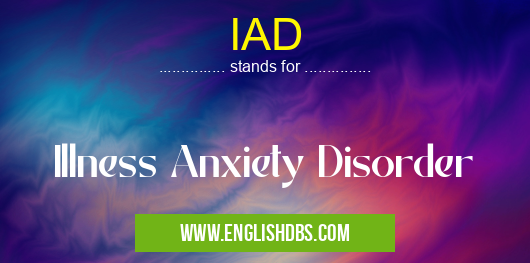What does IAD mean in DISEASES
Illness Anxiety Disorder (IAD), previously known as hypochondriasis, is a mental health condition characterized by excessive and persistent anxiety about having a serious illness. Individuals with IAD often misinterpret normal bodily sensations or minor symptoms as signs of a severe medical condition, leading to significant distress and impairment in daily functioning.

IAD meaning in Diseases in Medical
IAD mostly used in an acronym Diseases in Category Medical that means Illness Anxiety Disorder
Shorthand: IAD,
Full Form: Illness Anxiety Disorder
For more information of "Illness Anxiety Disorder", see the section below.
Symptoms
- Persistent and Excessive Anxiety: Intense and ongoing fear of acquiring or having a serious illness
- Misinterpretation of Bodily Sensations: Minor physical symptoms or sensations are exaggerated or misinterpreted as signs of disease
- Excessive Health-Related Behaviors: Frequent visits to doctors, excessive checking of body for symptoms, or avoidance of situations perceived as threatening
- Cognitive Distortions: Negative and catastrophic thinking patterns about health, focusing on worst-case scenarios and dismissing evidence of good health
- Avoidance and Restriction: Limiting activities or social interactions due to fear of illness exposure or symptoms
Causes
The exact cause of IAD is unknown, but several factors may contribute to its development, including:
- Personality Traits: Individuals with perfectionism, neuroticism, or anxiety-prone personalities may be more susceptible
- Genetic Predisposition: Family history of anxiety disorders or IAD may increase the risk
- Trauma or Stressful Events: Experiencing significant life stressors or traumatic events can trigger or exacerbate IAD
- Underlying Medical Conditions: In some cases, IAD may develop after a real or perceived health issue that raises concerns about future illness
Treatment
IAD can be effectively treated with a combination of psychotherapy and medication.
- Psychotherapy:
- Cognitive Behavioral Therapy (CBT): Helps individuals identify and challenge negative thought patterns and behaviors related to health anxiety
- Exposure and Response Prevention (ERP): Gradually exposes individuals to feared situations or sensations while teaching them coping strategies to manage anxiety
- Medication:
- Antidepressants: Selective serotonin reuptake inhibitors (SSRIs) or serotonin-norepinephrine reuptake inhibitors (SNRIs) may help reduce anxiety
- Anxiolytics: Benzodiazepines or non-benzodiazepine anxiolytics can provide short-term relief from acute anxiety symptoms
Essential Questions and Answers on Illness Anxiety Disorder in "MEDICAL»DISEASES"
What is Illness Anxiety Disorder (IAD)?
IAD, also known as hypochondriasis, is an anxiety disorder characterized by excessive and unreasonable fear of having a serious illness. Individuals with IAD constantly worry about their health and misinterpret bodily sensations as signs of illness.
What are the symptoms of IAD?
Symptoms of IAD include:
- Excessive worry about having a serious illness
- Misinterpreting normal bodily sensations as signs of illness
- Frequent health-related checkups and medical consultations
- Avoidance of activities due to fear of becoming ill
- Difficulty concentrating or enjoying activities due to health concerns
- Fatigue, irritability, and difficulty sleeping
What causes IAD?
The exact cause of IAD is unknown, but it is thought to be related to a combination of factors, including:
- Genetic predisposition
- Personal experiences of illness or exposure to medical trauma
- Cognitive distortions and negative beliefs about illness
- Personality traits such as anxiety and perfectionism
How is IAD diagnosed?
IAD is diagnosed by a mental health professional based on a clinical evaluation. The diagnosis may involve:
- A detailed interview about your symptoms and medical history
- Physical examination to rule out any underlying medical conditions
- Assessment of your thoughts, beliefs, and behaviors related to illness
How is IAD treated?
Treatment for IAD may include:
- Cognitive-behavioral therapy (CBT): CBT helps you identify and change negative thoughts and behaviors related to illness anxiety.
- Medication: Antidepressants and anti-anxiety medications may be prescribed to reduce symptoms of anxiety.
- Support groups: Joining a support group can provide you with a safe and supportive environment to share your experiences and learn from others with IAD.
Final Words: Illness Anxiety Disorder is a debilitating mental health condition that can significantly impact individuals' quality of life. However, with proper diagnosis and treatment, individuals with IAD can manage their anxiety and improve their overall well-being. It is crucial to seek professional help if you or someone you know is experiencing persistent and excessive health anxiety.
IAD also stands for: |
|
| All stands for IAD |
